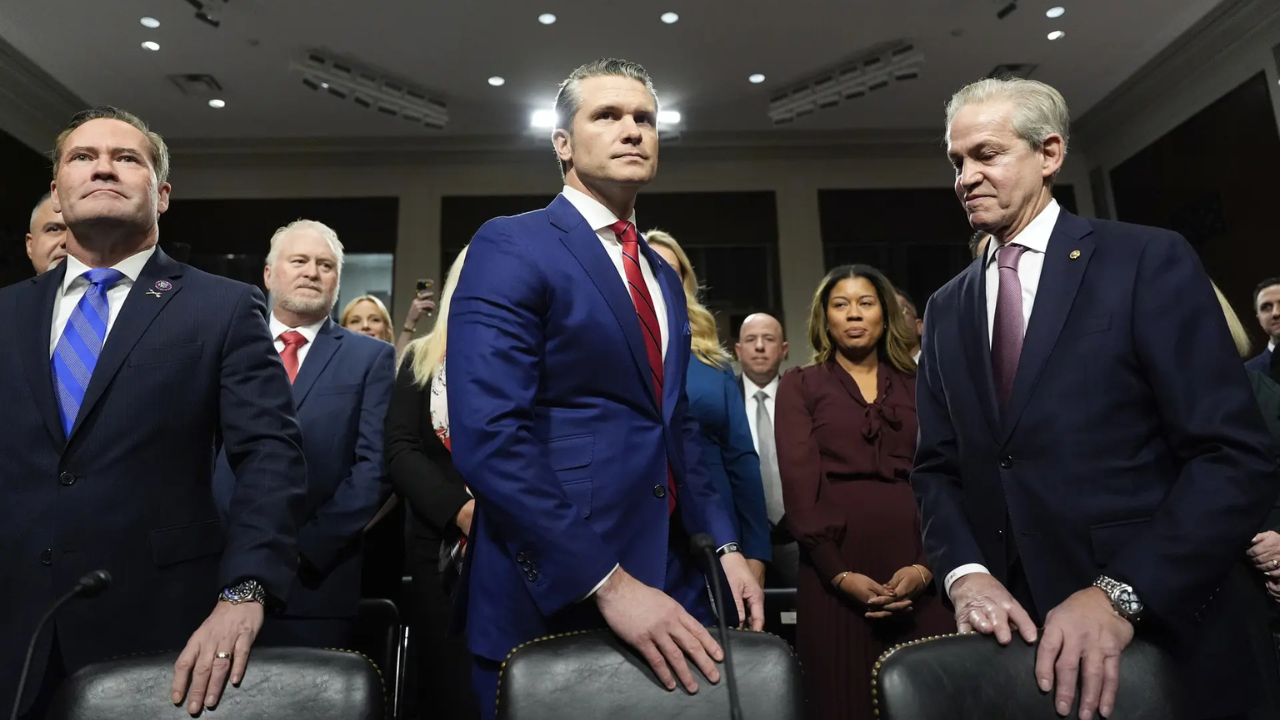Hegseth Confirmed as Secretary of Defense: A Nail-Biting Senate Vote and its Aftermath
In a dramatic turn of events that left the nation on the edge of its seats, Pete Hegseth was confirmed as the new Secretary of Defense late Friday night. The 50-50 Senate vote, decided by a tie-breaking vote from Vice President JD Vance, has ignited a firestorm of debate, dividing the country along partisan lines and sparking fervent discussion about his qualifications and suitability for the role. This controversial appointment is sure to reshape the future of US defense policy, leaving us to question: what does this mean for the future of American military strategy?
A Controversial Confirmation: Hegseth's Path to the Pentagon
Hegseth's journey to the Pentagon has been far from smooth. His nomination was met with fierce resistance from Democrats, who voiced serious concerns regarding his past conduct, controversial statements, and perceived lack of qualifications. The accusations levied against him – including allegations of sexual assault, financial mismanagement, and excessive drinking – overshadowed his military background and pro-Trump stance. Hegseth's controversial opinions about women's roles in the military further fueled the controversy and cemented opposition among Democratic senators.
Republican Support and Optimism: Hegseth's Supporters Rally
Despite the controversies, Republican senators largely rallied behind Hegseth, emphasizing his military experience and his unwavering support for a stronger, more assertive US defense policy. Senator Lindsey Graham, a prominent figure in the Republican party, lauded Hegseth's appointment, predicting he will invigorate the armed forces. Other Republicans shared Graham's sentiment, viewing Hegseth as the essential 'change agent' needed within the Department of Defense (DoD). Prominent conservative figures also expressed their strong support and enthusiasm.
Democratic Dissent: Concerns and Criticism Arise
On the other hand, the Democratic party presented a united front against Hegseth's nomination. Senate Minority Leader Chuck Schumer, voicing the concerns of many Democrats, characterized Hegseth as 'erratic and unqualified.' Senator Elizabeth Warren raised alarms about the potential risks Hegseth's appointment poses to national security. Senators such as Bernie Sanders criticized his history of controversial stances on various issues and questioned his preparedness for the role.
A Divided Senate and a Contentious Confirmation Process
Three Republican senators openly defied their party and sided with the Democrats, signifying the deep divisions even within the Republican party regarding Hegseth's fitness for office. This surprising dissent highlights the complexity of the confirmation process, which extended into a long night punctuated with high drama, suspense and anticipation. The 50-50 split, requiring Vice President Vance's tie-breaking vote, exemplifies the profound political divide surrounding this nomination and underscores the potential consequences of this appointment for the nation's future.
Analyzing Hegseth's Impact on US Defense Policy
Hegseth's appointment as Secretary of Defense marks a significant shift in the direction of US defense policy. His background and rhetoric suggest a potential increase in military spending, an intensified focus on deterring perceived threats (such as those posed by China and Iran), and a more assertive stance on foreign policy issues. But the long-term consequences of his appointment remain uncertain, depending on various factors.
Potential for Increased Military Spending and Modernization
With Hegseth at the helm, we might expect a renewed emphasis on bolstering the armed forces, potentially leading to significant increases in military spending and investments in new technologies and equipment. Such actions could further enhance US military strength, especially within current global conflicts.
Impact on Geopolitical Alliances
His opinions on various geopolitical issues, his alignment with certain political figures, and his proposed approaches could also impact international relations and existing defense partnerships. A more assertive approach could redefine alliances and foreign policies, affecting relations with nations worldwide and resulting in new collaborative ventures and conflicts.
Focus on Counter-Terrorism Efforts and Cybersecurity
The strategic focus of the Department of Defense could shift dramatically under Hegseth's leadership, likely prioritizing counter-terrorism efforts, cyber warfare defenses and deterring potential aggressors. He may also advocate for privatization of parts of the DoD, potentially creating long-term impacts on efficiency, oversight and transparency.
What Lies Ahead for the Department of Defense?
The future trajectory of the Department of Defense under Hegseth's leadership is shrouded in uncertainty. His unconventional background, coupled with his expressed policy preferences, raise many questions about his actual approach. The extent of his influence on military strategy, resource allocation, and global relations hinges upon multiple variables, with long-term consequences remaining elusive.
Navigating Political and International Tensions
Hegseth faces the formidable challenge of navigating increasingly complex geopolitical tensions, managing evolving conflicts and coordinating with allies in uncertain times. Domestically, he must manage differing priorities and navigate bipartisan political dynamics to succeed and ensure support and cohesion across the department. This requires delicate diplomacy and careful management to minimize friction.
Ensuring Efficiency and Effective Resource Allocation
With the allocation of billions in the US defence budget, the efficient allocation and effective utilization of resources becomes paramount to his success. This requires astute budgeting and careful strategic planning to ensure efficiency, accountability and optimized effectiveness in both training and technological applications within the military.
Balancing competing demands of budget cuts, new technology and recruitment
The new secretary of defense will need to manage a range of competing demands as they oversee the budget. Successfully executing the new direction involves balancing demands across several pressing areas: absorbing any necessary budget cuts and maintaining optimal efficiency with available resources, modernizing to incorporate new technology and advanced defense capabilities, and recruitment challenges for sufficient skilled personnel. His ability to find common ground between stakeholders will be critical for long-term success.
Take Away Points
- Pete Hegseth's confirmation as Secretary of Defense was a closely-contested, politically charged event.
- His appointment signals a potential shift toward a more assertive and potentially more militaristic US foreign policy.
- He faces significant challenges in navigating domestic political divisions and international tensions.
- The long-term consequences of his leadership remain uncertain and will depend on his decision-making in the years ahead. His success will rely on careful strategy and skillful management.




